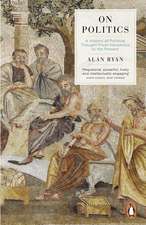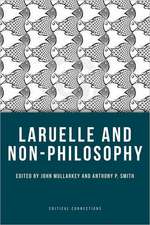J.S. Mill (Routledge Revivals)
Autor Alan Ryanen Limba Engleză Hardback – 23 mai 2016
| Toate formatele și edițiile | Preț | Express |
|---|---|---|
| Paperback (1) | 241.15 lei 6-8 săpt. | |
| Taylor & Francis – 18 ian 2018 | 241.15 lei 6-8 săpt. | |
| Hardback (1) | 764.20 lei 6-8 săpt. | |
| Taylor & Francis – 23 mai 2016 | 764.20 lei 6-8 săpt. |
Preț: 764.20 lei
Preț vechi: 1102.79 lei
-31% Nou
Puncte Express: 1146
Preț estimativ în valută:
146.22€ • 152.69$ • 120.75£
146.22€ • 152.69$ • 120.75£
Carte tipărită la comandă
Livrare economică 15-29 aprilie
Preluare comenzi: 021 569.72.76
Specificații
ISBN-13: 9781138683341
ISBN-10: 1138683345
Pagini: 295
Dimensiuni: 138 x 216 mm
Greutate: 0.45 kg
Ediția:1
Editura: Taylor & Francis
Colecția Routledge
Locul publicării:Oxford, United Kingdom
ISBN-10: 1138683345
Pagini: 295
Dimensiuni: 138 x 216 mm
Greutate: 0.45 kg
Ediția:1
Editura: Taylor & Francis
Colecția Routledge
Locul publicării:Oxford, United Kingdom
Cuprins
Preface; Introduction; Difficulties of the history of ideas James Mill; 1 The Autobiography 1806-1826; An educative autobiography The Early Draft Utilitarianism and education James Mill’s syllabus Mill and Dickens Youthful Benthamism; 2 The Autobiography 1826-1840; ‘Mental Crisis’ Its impace on Mill’s ideas Doubts about utilitarianism ‘The Spirit of the Age’ Disillusionment with radicalism Harriet Taylor Mill’s literary criticism ‘Bentham’ and ‘Coleridge’; 3 A System of Logic; Intuitionists and conservatives Analysis of meaning Mathematical truth The syllogism Causation Induction and its canons Free-will and social science False starts Sociology; 4 Utilitarianism; Its notoriety Mill’s audience Theological ethics Intuitionist ethics A logic of the imperative mood The Art of Life Utilitarianism The need for first principles Clarifications of the doctrine Motives and intentions Sanctions The 'proof’ of the principle of utility Utility and Justice; 5 Liberty and The Subjugation of Women; Harriet’s legacy Elitism of Liberty Truth or truths Freedom and happiness Liberty and its aims Free inquiry and science Religious freedom Individuality in mass society Duty and virtue Paternalism Saints and heroes Mill’s successors Extending interferences Women’s liberation; 6 The Principles of Political Economy; The interest of Mill’s economics Methodological views Distribution and property Wages, unionism and population The role of government Education Poor relief, colonies and public utilities The stationary state Mill’s critique of socialism; 7 Representative Government; Mill’s changing attitude to democracy The East India Company and bureaucracy Progress and political institutions The defence of democratic politics Mill’s neglect of party politics The role of expertise Minorities and their representation Plural voting The ballot Nationalism Mill and ‘democratic revisionism; 8 Hamilton, Comte and Religion; Background of Mill’s later work Matter Mind ‘To hell I will go’ Comte’s philosophy of science Comte’s illiberalism The religion of humanity ‘The Utility of Religion’ ‘Nature’ ‘Theism’; Notes; Bibliography; Index
Descriere
First published in 1974. As logician, economist, political theorist, practical politician and active champion of social freedom, John Stuart Mill is a figure of continuing importance. In this book the author does full justice to the range of Mill’s achievements, providing an introductory guide to his most important and best known writings. In their treatment of his works, the author seeks to emphasise Mill’s approach to those issues which remain most alive to us today. At the same time Mill is seen as part of his own age, responding to the anxieties that beset his contemporaries.

















